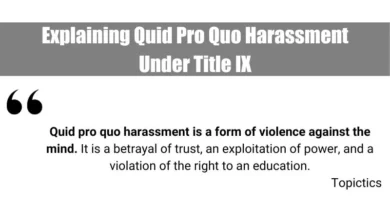What Constitutes Quid Pro Quo in Daily & Different Settings?
Latin phrase quid pro quo:
- Quid means “something” (often interpreted as “this”).
- Pro means “for.”
- Quo means “something else” (“that”).
Thus, the phrase “Quid Pro Quo” means “something for something” or “this for that.” For example, in daily transactions, if you go to a shop and buy something at its regular price, that’s a straightforward quid pro quo: your payment is the quid, and the item is the quo.
In another case, if you think the price is too high and ask for a discount, and the shopkeeper agrees, you both come to a new agreement. Your payment (after the discount) is still the quid, and the item is the quo. In both examples, a mutually agreed exchange takes place, which constitutes quid pro quo.
Takeaways
| Key Points |
|---|
| Quid pro quo is a Latin term meaning “something for something.” It refers to an exchange where one party provides something of value in return for a favor, service, or another item of mutually agreed upon value. |
| In business, quid pro quo can simply refer to legitimate reciprocal agreements where both parties agree to trade goods or services of mutual benefit. The legality depends on whether the exchange is transparent and lawful or involves coercion or illegal intentions, such as influencing official actions or decisions through personal gains. |
| In legal and political contexts, quid pro quo can sometimes involve unethical or illegal activities, such as bribery or coercion. For instance, in bribery cases, a person may offer money or benefits to a public official in exchange for specific actions or decisions. However, not all quid pro quo arrangements are illegal; it depends on the nature of the exchange and whether it violates laws governing ethics and transparency. |
| Similarly, in employment, quid pro quo harassment happens when a job benefit (like a promotion) is conditioned on submitting to unwelcome demands, such as sexual favors. |
Understanding Quid Pro Quo
Quid pro quo, a Latin phrase meaning “something for something,” represents the basic principle of an exchange in which a favor, service, or benefit is given in return for something of value. In its simplest form, it refers to mutual agreements where each party provides something in exchange for the other’s contribution. This can range from everyday transactions, like trading goods, to more complex legal or professional contexts.
In various fields, such as law, politics, business, and the workplace, the term has specific implications, especially when examining the fairness or legality of the exchange.
Legal Definitions and Examples

Quid pro quo is deeply rooted in contract law and business practices. In legal terms, the phrase signifies a reciprocal transaction in which one party provides a service, goods, or favor, and the other party provides something of equal, comparable, or mutually agreed upon value.
In contract law, this “consideration” is essential for validating agreements. While consideration—often likened to quid pro quo—is typically essential for forming a binding contract, not all contracts are void without it. In some cases, such as contracts under seal or situations involving promissory estoppel, a contract may still be enforceable even if there is no direct value exchange.
For example, a business might offer discounts to a loyal customer in exchange for that customer purchasing in bulk. Similarly, an individual could agree to a service in return for a favor, like a neighbor fixing your car in exchange for pet-sitting while they are on vacation. These instances are clear-cut examples of quid pro quo in action, where both parties stand to benefit from the exchange.
Quid Pro Quo in the Workplace

In the employment sector, quid pro quo often arises in the context of workplace harassment. Specifically, quid pro quo sexual harassment occurs when a supervisor or employer offers benefits, such as promotions, raises, or job security, in exchange for sexual favors. The key here is that an important employment decision hinges on whether the employee complies with the request. This form of harassment is illegal under U.S. labor laws and is strictly prohibited under Title VII of the Civil Rights Act.
For instance, if a manager promises a subordinate a promotion in exchange for sexual favors, this constitutes quid pro quo harassment. On the other hand, it can also involve a threat, where refusing to engage in sexual conduct results in negative consequences, such as demotion or loss of employment.
In broader terms, the concept can apply to any coercive exchange between individuals with unequal power in the workplace. The key element of quid pro quo harassment is that the victim’s submission or refusal directly impacts their employment benefits.
Quid Pro Quo in Politics

Political quid pro quo is often linked to corruption or perceived unethical conduct. It occurs when politicians exchange favors, such as policy support or government contracts, in return for contributions or personal benefits.
This concept is especially scrutinized in U.S. politics, particularly in campaign finance. For example, while a corporation may donate to a politician’s campaign with the hope of influencing policy, any explicit agreement to pass favorable legislation in return for such donations would be illegal and considered bribery.
Although not all such exchanges are unlawful, they can raise suspicions of corruption or bribery. Large campaign donations, in particular, may blur the line between legal contributions and illicit quid pro quo arrangements, leading to public skepticism and potential investigations.
Quid Pro Quo in Business

In business dealings, quid pro quo transactions are common and often necessary. These exchanges are usually lawful and form the backbone of contractual agreements. However, issues arise when the exchange involves unethical or illegal activities, such as insider trading or bribery. For example, an executive providing confidential information about the company in exchange for personal financial gain is considered illegal and unethical quid pro quo.
On a smaller scale, quid pro quo in business might involve exchanging favors, like partnering on projects, in exchange for future business advantages. While such transactions are not inherently illegal, they become problematic if they involve coercion, bribery, or deception.
Ethical Considerations
While the concept of quid pro quo is neutral in itself, ethical considerations arise depending on the context. In many cases, the problem stems not from the exchange itself but from its impact or the power imbalance between the parties involved. These exchanges can lead to unfair advantages or corrupt practices if not properly regulated or disclosed in areas like politics, law, and business.
For example, when one party holds significantly more power (such as a supervisor over an employee or a politician over a corporate donor), the quid pro quo exchange can become coercive. Similarly, an undisclosed exchange of favors can result in conflicts of interest, undermining public trust or leading to legal consequences.
To mitigate these issues, establishing clear guidelines, enforcing transparency, and promoting accountability in quid pro quo exchanges can help prevent power imbalances, coercion, and conflicts of interest, particularly in sensitive fields like politics, law, and business.
Conclusion
Quid pro quo remains an essential concept in many fields, from law and business to politics and workplace dynamics. It represents the idea of fair exchange but also highlights the ethical and legal issues that can arise when such exchanges become imbalanced or coercive. Whether in contract law, workplace harassment, or political dealings, the principle of “something for something” underpins much of our understanding of fair and reciprocal exchanges.
Careful attention must be paid to the power dynamics and legality of the exchange to prevent unethical or illegal outcomes.
FAQ
What is ‘Consideration’ in Contract Law, and how does it relate to quid pro quo?
In contract law, ‘consideration’ refers to the value exchanged between parties, forming the foundation of a binding agreement. It embodies the quid pro quo principle, where each party offers something of value—be it goods, services, or a promise—in return for a reciprocal benefit. This mutual exchange ensures that all parties have a stake in the contract’s execution, validating the agreement legally. For instance, in a service contract, one party’s consideration might be the service provided, while the other’s is the payment for that service.
How does ‘Reciprocity’ function in social psychology, and what role does it play in daily interactions?
‘Reciprocity’ in social psychology refers to the social norm where individuals respond to others’ actions with similar actions, fostering mutual benefit and cooperation. This principle is foundational in building social bonds and trust. For example, if someone helps a colleague with a task, the expectation is that the favor will be returned in the future, creating a cycle of positive exchanges that strengthen relationships and collaborative environments.
Can you explain ‘Bartering’ in economic terms and its relevance to modern transactions?
‘Bartering’ is the direct exchange of goods or services without the use of money. Historically, it was the primary trade method before the invention of currency. In modern times, bartering still occurs, especially in communities or networks aiming to conserve cash or utilize surplus goods and services. For example, a graphic designer might create a logo for a baker in exchange for a certain amount of baked goods, exemplifying a quid pro quo arrangement without monetary involvement.
What constitutes ‘Quid Pro Quo Harassment’ in employment law, and what are its implications?
‘Quid Pro Quo Harassment’ in employment law occurs when a person in authority demands sexual favors from a subordinate in exchange for workplace benefits, such as promotions, raises, or continued employment. This form of harassment exploits power dynamics and is illegal under laws like Title VII of the Civil Rights Act of 1964. Victims may face adverse job consequences for refusal, and employers can be held liable for not addressing such misconduct. For instance, if a supervisor implies that an employee’s job security depends on acquiescing to sexual advances, it constitutes quid pro quo harassment.
How does ‘Lobbying’ operate within political systems, and when does it cross into unethical territory?
‘Lobbying’ involves individuals or groups attempting to influence political decisions in their favor, often by providing legislators with information, expertise, or financial support. While lobbying is a legitimate practice in many democracies, ensuring that diverse voices are heard in policy-making becomes unethical or illegal when it involves bribery or undue influence, such as offering money or gifts in exchange for specific legislative actions. Transparency and regulation are key to maintaining ethical lobbying practices.
What defines ‘Bribery’ in criminal law, and how does it differ from legal quid pro quo arrangements?
‘Bribery’ is the act of offering, giving, receiving, or soliciting something of value to influence the actions of an official or someone in a position of authority. Unlike legal quid pro quo arrangements, which involve lawful exchanges of value, bribery is illegal and undermines the integrity of institutions. For example, paying a government official to secure a contract constitutes bribery, as it involves corruption and a breach of public trust.
What is the ‘Pay-to-Play’ practice in business and politics, and why is it controversial?
‘Pay-to-play’ refers to situations where access to services, opportunities, or political favors is contingent upon making contributions or payments. This might involve requiring donations to a campaign in exchange for government contracts in politics. This practice is controversial because it can lead to corruption, favoritism, and unequal access based on financial means, undermining merit-based systems and public trust.
How does ‘Mutual Aid’ function in community organizing, and what distinguishes it from other support systems?
‘Mutual Aid’ involves voluntary, reciprocal exchanges of resources and services for mutual benefit within a community. Unlike charity, which often flows from the more privileged to the less privileged, mutual aid is based on solidarity and collective support, with all participants contributing and receiving according to their abilities and needs. For example, community members might pool resources to support each other during a crisis, embodying a grassroots approach to collective welfare.
Can you define ‘Kickbacks’ in the context of business ethics and explain why they are problematic?
A ‘Kickback’ is a form of negotiated bribery where a commission is paid to the bribe-taker in exchange for facilitating a transaction or appointment. Kickbacks are problematic because they involve secretive agreements that distort fair business practices, lead to inflated costs, and undermine trust in institutions. For instance, a contractor might pay a kickback to a government official to secure a contract, resulting in unethical decision-making and potential legal consequences.
What characterizes a ‘Hostile Work Environment’ under employment law, and how does it differ from quid pro quo harassment?
A ‘Hostile Work Environment’ occurs when an employee experiences workplace harassment or discrimination that is pervasive enough to create an intimidating, hostile, or offensive work atmosphere. Unlike quid pro quo harassment, which involves explicit exchanges of job benefits for sexual favors, a hostile work environment may involve ongoing inappropriate conduct, such as unwelcome comments, jokes, or physical actions, that interfere with an employee’s ability to perform their job.
How is a ‘Conflict of Interest’ defined in professional ethics, and what measures are taken to manage it?
A ‘Conflict of Interest’ arises when an individual’s personal interests have the potential to interfere with their professional duties or decisions. This can compromise objectivity and integrity. To manage conflicts of interest, organizations implement policies requiring disclosure of potential conflicts, recusal from decision-making where conflicts exist, and, in some cases, divestment from conflicting interests. For example, a public official who owns stock in a company bidding for a government contract should disclose this interest and abstain from the decision-making process.
What constitutes ‘Extortion’ in criminal law, and how does it differ from bribery?
‘Extortion’ is the act of obtaining money, property, or services from an individual or institution through coercion, which may involve threats of physical harm, property damage, or exposing sensitive information. Unlike bribery, where an individual offers something of value to influence another’s actions voluntarily, extortion involves the use of threats to compel someone to provide benefits against their will. For example, a person threatening to release embarrassing personal information unless paid a sum of money is committing extortion.
How does ‘Nepotism’ manifest in organizational settings, and what are its potential impacts?
‘Nepotism’ refers to the practice of favoring relatives or close friends by those in power, especially in job appointments or promotions, regardless of merit. In organizational settings, this can lead to unqualified individuals occupying positions, which may result in decreased employee morale, reduced productivity, and potential legal challenges. For instance, promoting a family member to a managerial role over more qualified candidates can cause resentment among staff and undermine the organization’s credibility.
What is ‘Favoritism’ in management, and how can it affect workplace dynamics?
‘Favoritism’ in management occurs when supervisors give preferential treatment to certain employees based on personal biases rather than job performance or qualifications. This can manifest in various ways, such as assigning desirable projects, offering promotions, or providing leniency in rule enforcement to favored individuals. Such practices can lead to a toxic work environment, decreased employee motivation, and increased turnover, as employees perceive the workplace as unjust and their efforts unrecognized.
How does ‘Insider Trading’ violate financial laws, and what distinguishes it from regular trading activities?
‘Insider Trading’ involves buying or selling a publicly traded company’s stock or other securities by someone who has non-public, material information about that company. This practice is illegal because it gives an unfair advantage and undermines investor confidence in the fairness and integrity of the securities markets. Unlike regular trading based on publicly available information, insider trading exploits confidential information for personal gain. For example, if an executive knows about an upcoming merger that will increase the company’s stock value and purchases shares before the information is public, they are engaging in insider trading.









